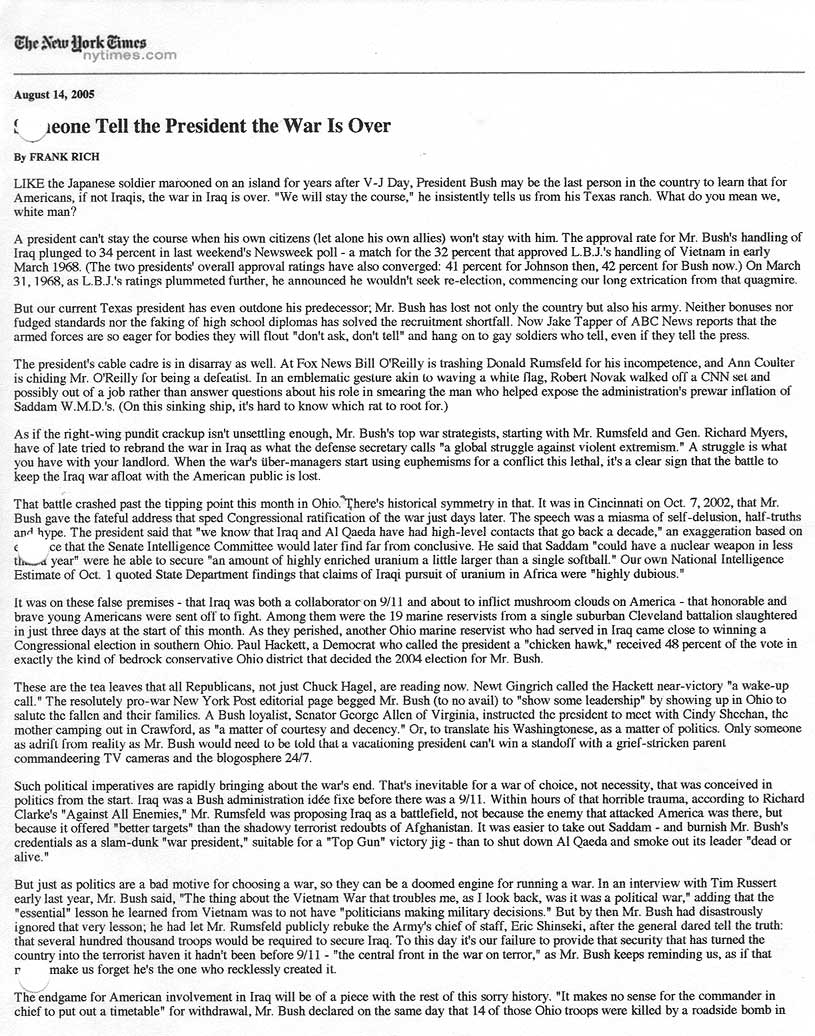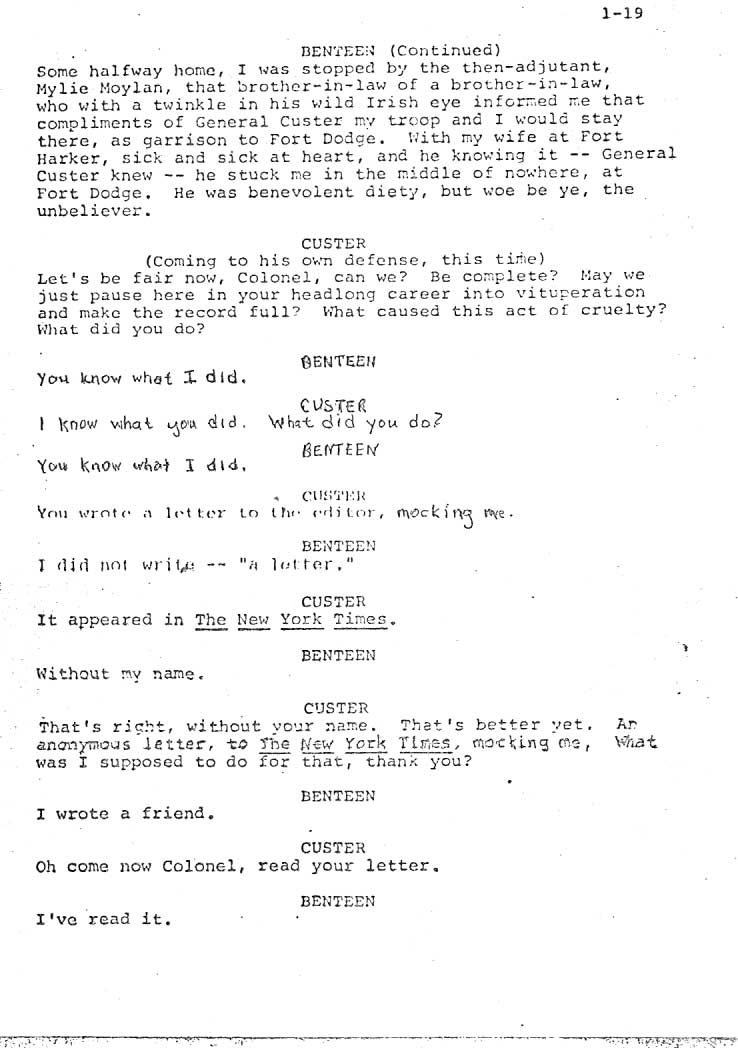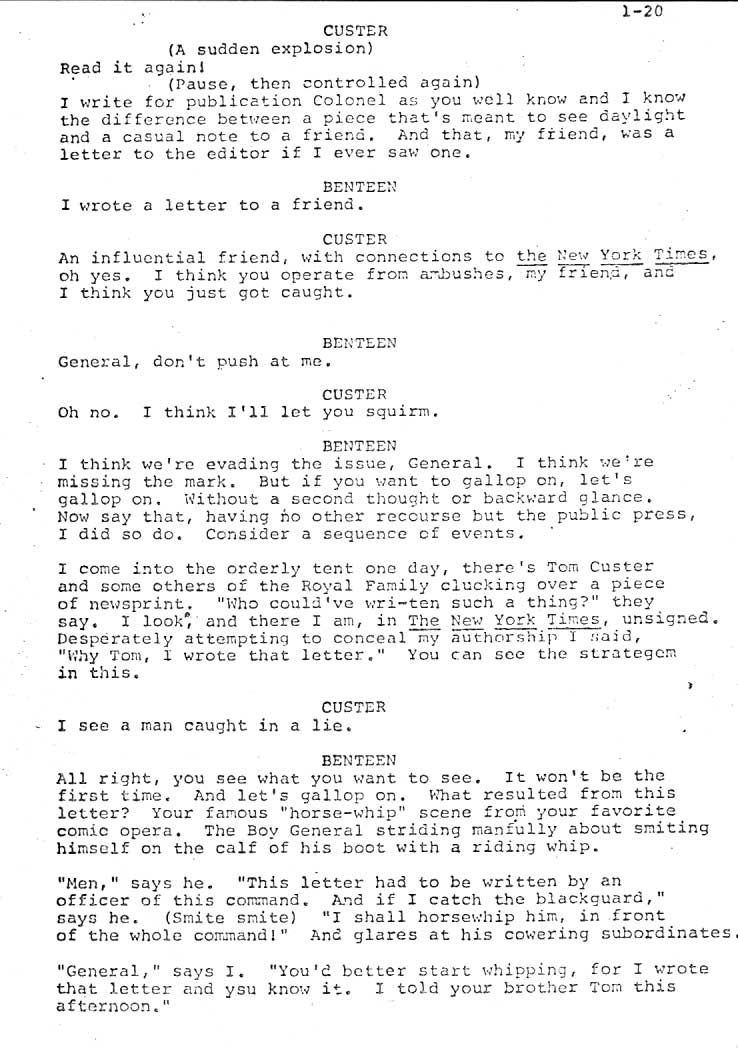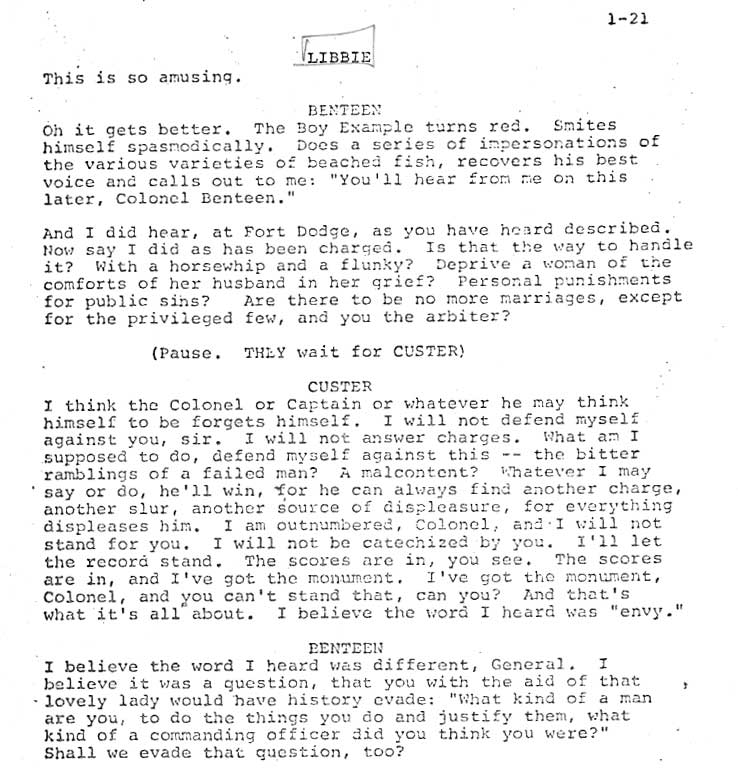

“CUSTER”
By Robert Ingham
Genre: Drama
Cast: 8
Male: Custer, Benteen, Reno
Female: Libby Custer
Ensemble: 2 male, 2 female (or more if desired)
These
are substantial roles, must be able to sing a capella
All
ethnicities desired
CUSTER is performed in limbo. It is elegant in
construction, style and word. It is an historical retrospective inspired by
George A. Custer's last stand at Little Big Horn. It is a consideration of
defining moments and how people define them differently, and it is about the
elasticity of interpretation, the inability to control what other people think.
In a larger sense, however, it is about life-altering decision-making, informed
by lack of perspective and self-interest, including self-preservation, although
Custer's predominant objective had little to do with preservation on this
earth.
I
performed in the award-winning premiere of CUSTER in 1980 at The Kennedy
Center. It was a joyous experience. I portrayed Custer's wife, “Libby,” so I
paid particular attention to Custer's personality, especially his narcissism,
temperament and caprice. The other army officers depicted in the play,
Frederick Benteen and Marcus Reno, were powerful personalities, but neither was
as mercurial as Custer, nor did they compare in panache. John McMartin played
Benteen with a razor sharp wit, a well of fury, tempered by southern manners.
It is a thrilling part. The intensity, intelligence, and fundamental, opposing
beliefs between these two orators makes for a hellish courtroom drama that is
as frustrating and thrilling as “Inherit The Wind.”
The thrust of the play involves the three
characters taxing one another to justify their actions, but one has a sense
that if they could compromise, admit some accountability, they would be better
off. Benteen is more evolved and ready to accept his fate. Poor Reno is in a
personal hell of his own. No
matter how he struggles to defend his actions, he knows he was a coward. He
saved his men’s lives, but he did not charge when the call for help came. For a
soldier, that is a crime. Because he is a true soldier, he will never be able
to forgive himself and will live in his hell for eternity. Custer, on the other
hand, never admits any accountability. Libby is a First Lady. She cannot be
swayed. She supports her husband. So, the latter three characters remain stuck.
The four ensemble players are the young men and
women waiting for battle to begin. They tell us their stories, how they see
things, sing music when they get scared, write home to their wives and serve to
reenact the battle. They are in limbo as well. They have committed no crimes
but are still sorting out exactly what happened. It’s as if they are suffering
from post-traumatic stress syndrome. What happened was so ghastly that their
minds simply cannot comprehend.
In my opinion this play is more relevant than
ever. There are contemporary parallels to be drawn from CUSTER. We follow such
leaders into battle, leaders who have foibles, leaders all too human. As in
Iraq, we still commandeer the fate of indigenous people and prescribe behavior
to meet our needs. Or, to be more specific, it is virtually impossible not to
draw connections between George Armstrong Custer and George W. Bush. There is a
shared philosophy of “We will stay the course no matter what reality is placed
before us.” On occasion, those who have dared to disagree with these commanders
in chief have been publicly rebuked, demoted, or exposed. Both George Custer
and George Bush have administered public justice in personal ways. Valerie Plame
would be able to speak on this subject. Or, read the attached August 14th,
2005 article in the New York Times, “Someone Tell The President that the War is
Over,” by Frank Rich. In it, “Rumsfield publicly rebuked the Army’s chief of
staff, Eric Shinseki, after the general dared tell the truth: that several
hundred thousand troops would be required to secure Iraq.” Custer placed close
family members and personal friends in charge of important posts, as Bush does,
so both leaders often seek advice from unprofessional advisors. Further
similarity is evident in the book “Crazy Horse and Custer, The Parallel Lives
of Two American Warriors,” by Stephen Ambrose. Students will discover that
Crazy Horse, Custer, and Bush were too entrenched in their respective culture
to understand the culture of their opponents.
Politics aside, CUSTER is about interdependence,
in battle and in love. The transcendent panoply of human emotion and drive
governs behavior then, now and always. The play is abiding, alluring; it is
about hero worship, compliance and consequence… 'Whom will I imprint on? Whom
will I follow into battle? Upon what song, what battle cry, will I bequeath
reason and ride to my death?'
The
music in CUSTER is rowdy, compelling or sad. It serves the piece with specificity,
embellishing the Spartan structure beat by beat with appropriate intensity, but
neither the music nor the play builds to crescendo. Instead, we are escorted to
a moment of rumination after retired General Benteen has granted a battalion of young
cavalrymen the favor of an inspection. “Well, small honors are sweet, so at the
appointed hour I bounded down my terraces, past my arbors and bushes blooming,
to stand at the side of the dusty road and watch these young aspirants to fame
at thirteen dollars the month go on marching past. And as I stand there,
watching them go on down the road, it occurs to me that there is an emotion
missing. There should be some sort of 'God, I wish I was going with you,' from
the old soldier. But I examined myself, and it was not there. Wherever that
dusty road might take them, I'd been down it. It was an interesting voyage all
in all and I don't regret it. But I'd done it. And now, I'd rather go find a
good baseball game.”
“It was an
interesting voyage all in all and I don't regret it.” That is the
estimation of one’s lifetime that the play, CUSTER, urges its audience to
aspire to, prevailing upon the unfledged to live to their greatest
satisfaction. This portrayal of momentous people in poignant conflict makes the
message all the more accessible. CUSTER challenges us to maximize our lives
through thought, effort, accountability and courage, not in charging ahead in
reckless pursuit of glory, but in charging ahead with joy, gratitude and the
knowledge that we walk this way by once.




